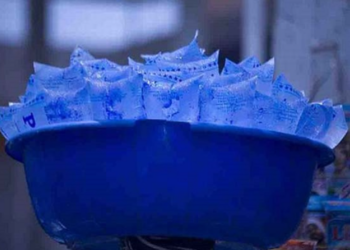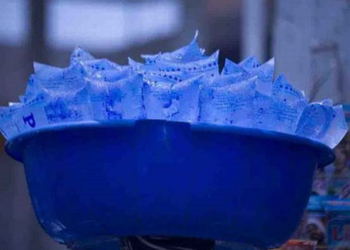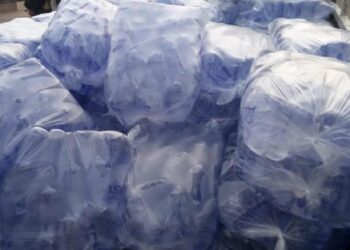A survey conducted by Nairametrics in Lagos, Port Harcourt and Abuja between April 14 and April 18 has revealed that sachet water, popularly known as pure water, currently sells faster than any other commodity in the micro business sector in Nigeria.
Responding to a question regarding which product customers buy most frequently at shops, all the respondents (who are shop owners) replied as if in unison that pure water is the fastest selling commodity and the most profitable.
Mama Chisom, who runs a provision shop in Orile in Lagos, told Nairametrics that pure water gives her the fastest turnover among all the provisions she sells. She further said she struggles to meet up with the demand for pure water, adding that she sells a bag of pure water every 10 or 15 minutes. She stressed that with the speed at which customers demand pure water, and the profit margin on each bag, the pure water business is the most profitable among all her stock of goods.
She told Nairametrics that she buys a bag of pure water for N300 and sells at a rate of two for N50. “At that rate, I make a profit of N200 every 10 or 15 minutes. That is good business,” she said.
Elizabeth Akanji, also a shop owner that sells near Oyingbo Market, related a similar narrative to Nairametrics, but insisted that a bag of water does not last up to 10 minutes in her stock. She boasted that many times she sells a bag within five minutes and makes not less than N200 profit on a bag.
The profit margin is even more in Port Harcourt, the survey reveals. Whereas the producers sell to distributors at the rate of N400 per bag, the retail price of a sachet of water is N50.00. That means a profit margin of N600 on each bag of water.
According to Dieye Wilson, a small shop owner in Mile One Market, pure water is the fastest selling commodity in her shop. She says it has always been like that. Wilson told Nairametrics, “I sell one sachet of pure water every minute. No other good in my shop sells faster than that. In fact, pure water keeps me on my toes every minute and I don’t play with it because there’s profit in the pure water business,” she stated.
Esther Ogamba, who owns a provision store in Sand Filled, Port Harcourt, also agreed that pure water is the fastest selling commodity in her stock of goods. She explained that business is never bad with pure water, especially during the dry season. “Even when business is poor with other commodities, pure water is always on the fast lane, especially during the dry season,” she told Nairametrics in a telephone interview.
In Abuja, where the profit margin for a bag of pure water is also N600, the speed at which a bag is sold for is incomparable to any other product at shops, according to Usman, who runs a kiosk shop near Utako Market.
Usman said he buys a bag of water from the producers at the rate of N400 and sells each sachet at the rate of N50. In a phone conversation, he said he sells a bag of water at most every 30 minutes, stressing that pure water is the most demanded product in his shop.
But a street hawker in the same vicinity, Sarah, asserted that she hawks only sachet water at Arap Junction, and makes more than N7,000 daily. “From my daily sales, I feed my family and send my two children to school. It is good business,” she said.
The result of a survey conducted by the Department of Community Medicine, University of Jos, has noted that during the dry season about 70% of Nigerian adults drink, at least, a sachet of water per day.
The survey showed that respondents sourced their drinking water from multiple sources, with sachet water being the most predominant (93.1%). Other sources were: municipal tap water supply (45.0%), bottled water (34.2%), rain water (19.7%), boreholes (19.4%), wells (14.4%) and streams (0.6%). Respondents were asked whether their use of sachet water had increased in the last five years, to which 62.4% of the respondents said “yes” and 37.6% that said “no”.
Those who said yes attributed it to scarcity of alternative sources of potable water, increase in the household population and easy accessibility of sachet water. The modal average daily intake of sachet water was 3. Among respondents using sachet water, reasons given for its use include its cheaper cost compared to other forms of packaged water, safety, lack of availability of other safe sources, National Food and Drug Administration and Control (NAFDAC) approval and its portability. The perception of the safety of sachet water rose by 68%.
Responding, Dr. Aloysius Akpan, an economist, said water is a necessity of life. “Since Nigeria lacks potable water, it is only natural that substitutes like sachet water that can be monitored for health considerations will fill that gap. I reckon that more than 300 million of sachet water are consumed by Nigerians daily,” he said.























